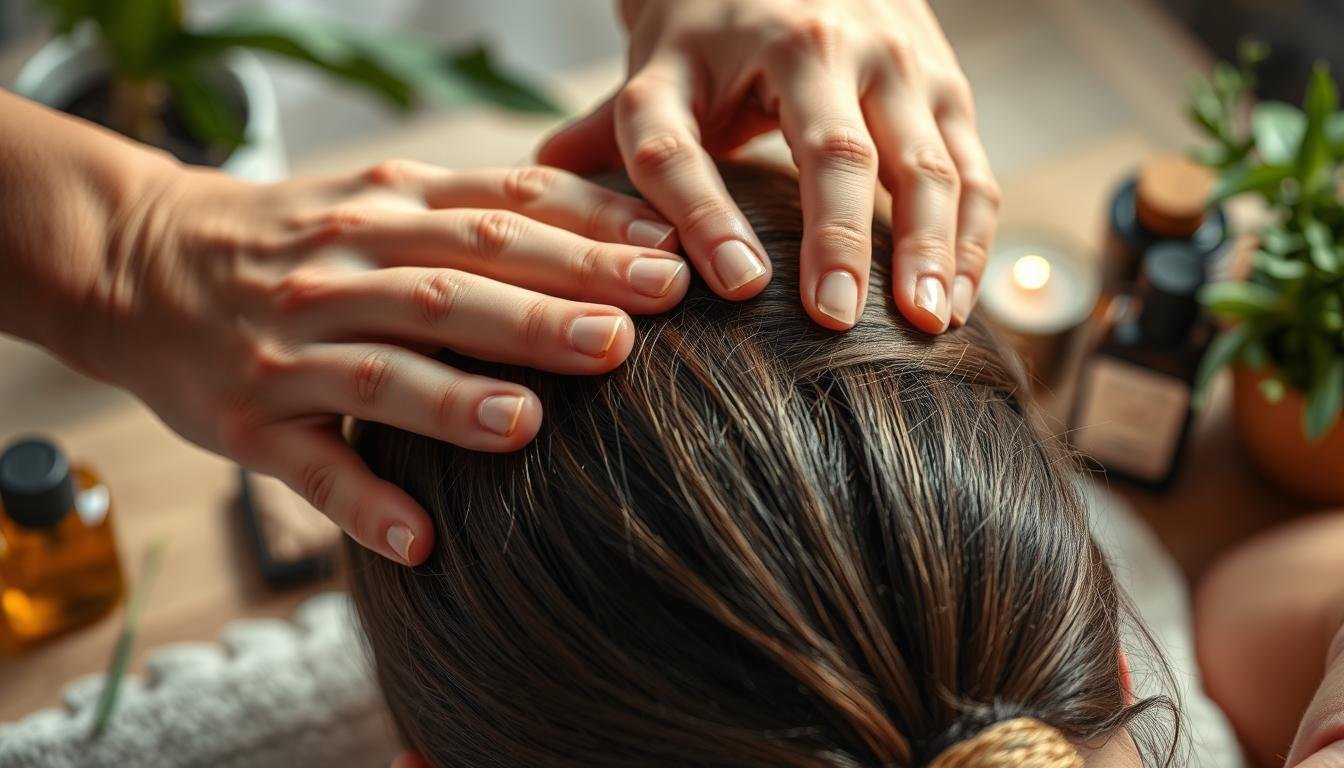How to Treat an Itchy Scalp? Quick Relief Tips
Nearly 50% of a coconut’s fat content is lauric acid, making it a soothing treatment for an itchy scalp. This unexpected fact highlights the potential of natural remedies in providing relief from scalp pruritus, a common condition affecting many individuals. From using coconut oil to incorporating essential oils like peppermint, there are various quick relief tips that can help alleviate the discomfort of an itchy scalp.
Key Takeaways
- Coconut oil and peppermint oil have been shown to effectively reduce scalp itchiness.
- Apple cider vinegar rinses and salicylic acid-based shampoos can help manage symptoms of an itchy Scalp.
- Scalp massages with essential oils like tea tree oil can provide soothing relief.
- Maintaining a Clean and healthy Scalp through regular hair care routines is crucial.
- Seeking medical attention is advised if symptoms persist or worsen.
Understanding the Causes of an Itchy Scalp
A persistent, irritating itch on the Scalp can be a source of great discomfort and frustration. Understanding the underlying causes is the key to finding effective relief. From common conditions like dandruff and seborrheic dermatitis to more severe issues like psoriasis, the origins of an itchy scalp can vary widely.
Common Causes of Itchy Scalp
Some of the most prevalent causes of an itchy scalp include:
- Dandruff: A common scalp condition characterized by flaky, white skin particles in the hair.
- Seborrheic dermatitis: An inflammatory skin condition that leads to redness, oily skin, and scaly patches on the Scalp.
- Psoriasis: A chronic autoimmune disorder that can cause thick, scaly patches on the scalp and other areas of the body.
- Reactions to hair products: Certain shampoos, conditioners, or styling products can trigger an allergic reaction, leading to an itchy scalp.
- Hives: These raised, itchy welts on the skin can also appear on the scalp, often due to an allergic reaction or sensitivity.
- Ringworm: A fungal infection that can spread to the scalp, causing a red, circular rash and intense itchiness.
- Head lice: These tiny, parasitic insects can infest the scalp and cause persistent itching.
- Acne: Breakouts on the scalp can also contribute to an itchy, irritated sensation.
When to Seek Medical Attention
If the itchiness on your scalp lasts for more than a week, is accompanied by pain, sores, or swelling, or disrupts your sleep or daily activities, it’s time to seek medical advice. A dermatologist can help diagnose the underlying cause and recommend the appropriate treatment, whether it’s over-the-counter remedies or prescription-strength solutions.
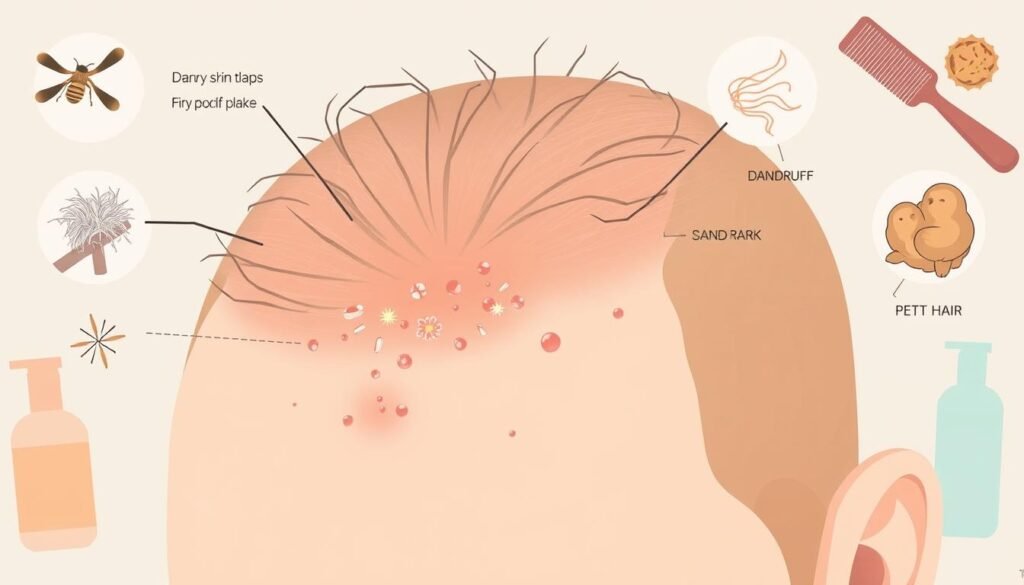
Home Remedies for Itchy Scalp Relief
If you’re struggling with an itchy scalp, there are several natural remedies you can try at home for quick relief. From the soothing properties of aloe vera to the moisturizing benefits of coconut oil, these home remedies can provide a gentle and effective solution.
Aloe Vera: A Natural Soothing Solution
Aloe vera is renowned for its calming and anti-inflammatory properties. Simply cut a fresh aloe vera leaf, extract the gel, and gently massage it into your scalp. The cooling sensation can provide instant relief from itchiness and irritation. Leave the aloe vera on your scalp for 15-20 minutes before rinsing it off with cool water.
Coconut Oil for Moisture
Coconut oil is another powerful home remedy for an itchy scalp. Its antifungal and antibacterial properties can help soothe the skin, while its moisturizing abilities can alleviate dryness. Warm a small amount of coconut oil and massage it into your scalp. Let it sit for 30 minutes to an hour before shampooing it out.
For added benefits, you can also mix tea tree oil or apple cider vinegar into the coconut oil before application. Tea tree oil has antimicrobial properties that can help fight fungal or bacterial infections, while apple cider vinegar’s potential antioxidant effects may help reduce inflammation.
Remember to always perform a patch test before using any new essential oils, as they can potentially cause skin irritation if used undiluted.
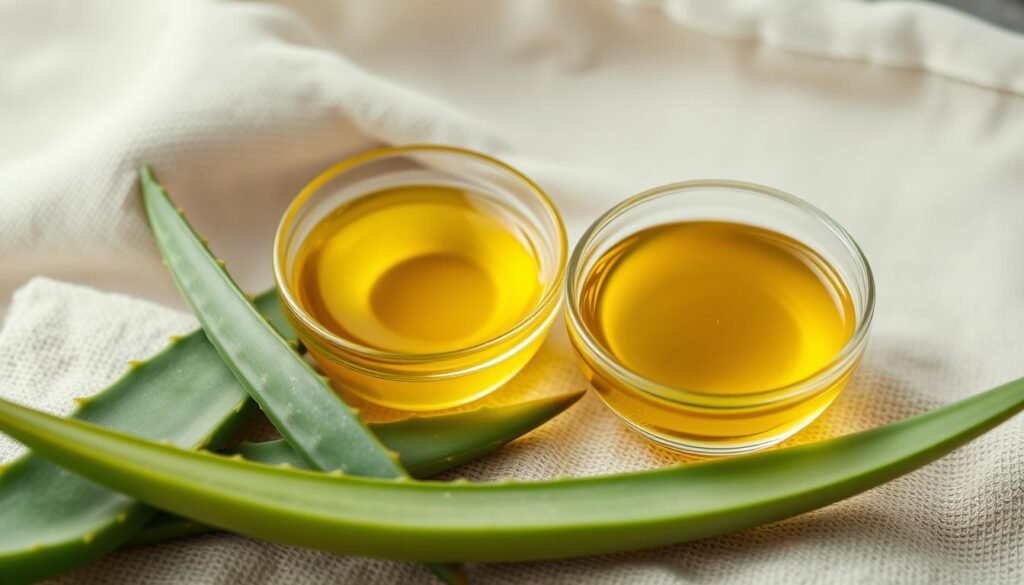
“Home remedies like oatmeal, tea tree oil, and apple cider vinegar can be effective in providing relief for an itchy scalp.”
Over-the-Counter Treatments You Can Try
When it comes to managing an itchy scalp, over-the-counter (OTC) treatments can provide welcome relief. These readily available options target the underlying causes of scalp irritation, offering a convenient and cost-effective solution. Let’s explore some of the OTC treatments that can help soothe your itchy scalp.
Antidandruff Shampoos: How They Work
Antidandruff shampoos containing active ingredients like zinc pyrithione, salicylic acid, and ketoconazole can be highly effective in addressing scalp issues. Zinc pyrithione helps reduce the fungal growth that causes dandruff, while salicylic acid exfoliates the scalp, removing flaky skin and improving topical medication absorption. Ketoconazole, on the other hand, is a potent antifungal that can combat yeast infections responsible for an itchy scalp.
Scalp Lotions and Treatments
In addition to medicated shampoos, over-the-counter scalp lotions and treatments can provide targeted relief. These products often contain ingredients like tea tree oil, peppermint oil, and lemongrass oil, which possess natural soothing and anti-inflammatory properties. Applying these lotions directly to the scalp can help reduce itchiness, redness, and irritation.
| Active Ingredient | Condition Treated | Effectiveness |
|---|---|---|
| Zinc Pyrithione | Dandruff, Seborrheic Dermatitis | Reduces fungal growth and flakiness |
| Salicylic Acid | Scalp Psoriasis | Exfoliates the scalp and improves medication absorption |
| Ketoconazole | Yeast Infections | Effective antifungal treatment for itchy scalp |
| Tea Tree Oil, Peppermint Oil, Lemongrass Oil | General Scalp Irritation | Natural soothing and anti-inflammatory properties |
Remember, while OTC treatments can provide relief, it’s essential to consult a dermatologist if the itchiness persists or worsens. They can help identify the underlying cause and recommend the most appropriate treatment plan for your specific condition.
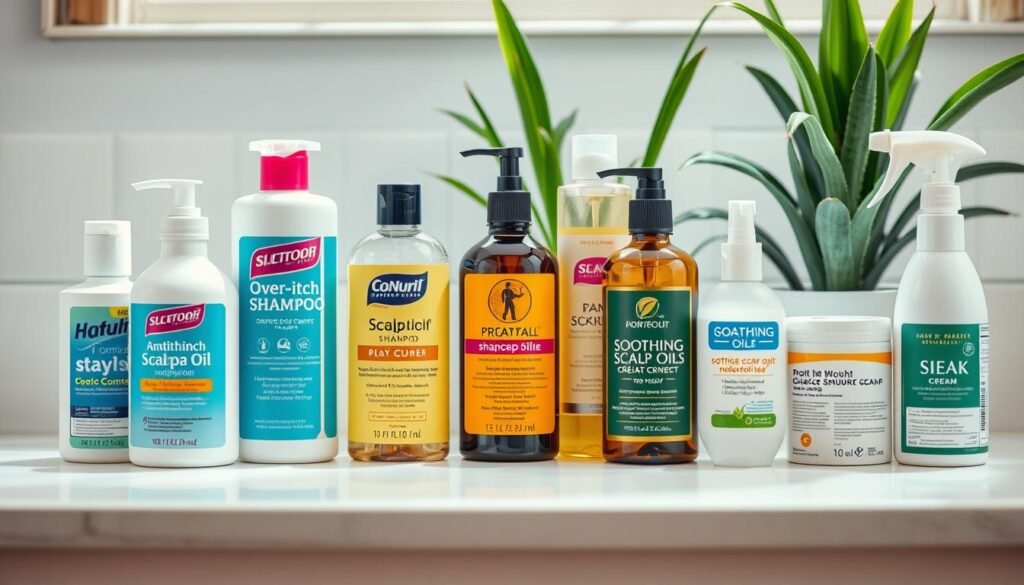
The Importance of Scalp Hygiene
Maintaining proper scalp hygiene is crucial for preventing and managing an itchy scalp. Your hair washing routine plays a vital role in keeping your scalp healthy and happy. Those with straight hair may need to wash daily or every other day, while those with curly or textured hair may only require weekly washing.
Tips for Maintaining a Clean Scalp
- Use warm water instead of hot water to avoid drying out the scalp.
- Gently massage your scalp during hair washing to stimulate blood circulation and remove product buildup.
- Incorporate a scalp massage into your hair care routine to promote healthy skin and hair growth.
The Role of Hair Products in Scalp Health
Be cautious when using hair products, as they can sometimes cause contact dermatitis and contribute to scalp issues. Opt for gentle, hydrating conditioners that nourish the scalp without stripping it of its natural oils. Avoid products with harsh chemicals, which can irritate the scalp and lead to further hair washing routine problems.
| Product Ingredient | Effect on Scalp |
|---|---|
| Sulfates | Can strip the scalp of its natural oils, leading to dryness and irritation. |
| Alcohols | May cause the scalp to become dehydrated and prone to flaking. |
| Fragrances | Can trigger allergic reactions and contact dermatitis on the scalp. |
By maintaining a clean, healthy scalp and using gentle, nourishing hair products, you can effectively prevent and manage an itchy scalp, promoting overall hair and scalp health.
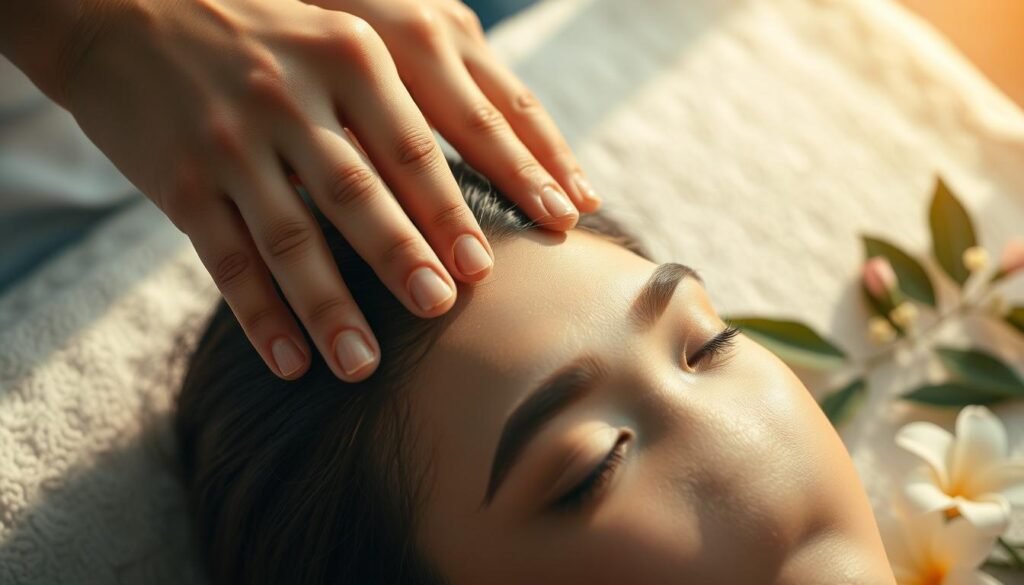
Dietary Changes for Scalp Health
While the health of your scalp may not be the first thing that comes to mind when considering your diet, what you eat can actually have a significant impact on the condition of your skin, including your scalp. Incorporating nutrient-rich foods into your meals can promote a healthier, less itchy scalp.
Foods That Promote Healthy Skin
Foods rich in omega-3 fatty acids, antioxidants, and essential vitamins and minerals can work wonders for your scalp health. Salmon, mackerel, and sardines are excellent sources of omega-3s, which help maintain scalp hydration and reduce inflammation. Berries, sweet potatoes, and leafy greens are packed with antioxidants and vitamins that protect the scalp from oxidative stress.
Additionally, nuts, seeds, and avocados provide a wealth of zinc and vitamin E, both of which are crucial for proper skin cell function and a healthy scalp.
Hydration and Its Benefits
Adequate hydration is essential for maintaining a healthy scalp. Drinking enough water helps keep the skin on your scalp moisturized, potentially reducing itchiness and flakiness. Aim to drink at least eight cups of water per day to ensure your body and scalp are properly hydrated.
| Nutrient-Rich Foods for Scalp Health | Benefits |
|---|---|
| Salmon, mackerel, sardines | High in omega-3 fatty acids to reduce inflammation and maintain hydration |
| Berries, sweet potatoes, leafy greens | Rich in antioxidants and vitamins to protect the scalp from oxidative stress |
| Nuts, seeds, avocados | Provide zinc and vitamin E for proper skin cell function and a healthy scalp |

“Sugars and simple carbs might promote more inflammation in our bodies, so eating a low-sugar, antioxidant-rich diet could help control dandruff flares.”
– Jessica Krant, MD
When to Consult a Dermatologist
If the symptoms of an itchy scalp persist after trying home remedies and over-the-counter treatments, it may be time to seek professional help from a dermatologist. Dermatologists are specialized medical professionals who can diagnose and treat a wide range of scalp and skin conditions.
Signs You Need Professional Help
Some key signs that it’s time to consult a dermatologist for an itchy scalp include:
- Severe, persistent itching that does not improve with self-care measures
- Visible skin changes, such as redness, flaking, or scaling
- Painful or inflamed scalp
- Symptoms that interfere with sleep or daily activities
- Recurrent or worsening issues, even after trying home remedies
Common Dermatological Treatments
Depending on the underlying cause of the itchy scalp, a dermatologist may recommend one or more of the following prescription treatments:
- Corticosteroid shampoos containing clobetasol propionate for severe psoriasis
- Malathion lotion or spinosad suspension for persistent head lice
- Antifungal medications for seborrheic dermatitis or other fungal infections
- Medicated creams or ointments to reduce inflammation and itching
- Light therapy or other specialized treatments for chronic scalp conditions
By seeking a dermatologist consultation, you can get to the root of your itchy scalp issue and receive personalized, professional guidance on the most effective treatment options.

“Consulting a dermatologist is the Best way to find lasting relief for persistent or severe itchy scalp issues.”
Lifestyle Modifications to Reduce Itchiness
Maintaining a healthy lifestyle can play a significant role in managing an itchy scalp. Two key areas to focus on are stress management and avoiding irritants in hair care products.
Stress Management Techniques
Stress can exacerbate skin conditions and contribute to an itchy scalp. Incorporating meditation into your daily routine has been shown to reduce stress and may help alleviate symptoms of conditions like eczema that can cause scalp irritation.
- Try practicing mindfulness meditation for 10-15 minutes each day to calm the mind and body.
- Engage in other relaxing activities like yoga, deep breathing exercises, or listening to soothing music to promote stress reduction.
Avoiding Irritants in Hair Care Products
The products you use on your hair and scalp can also play a role in itchiness. Opt for hypoallergenic and fragrance-free hair care products if you have sensitive skin. Avoid using harsh chemicals or known irritants that can exacerbate your condition.
If you suspect a particular product is causing irritation, discontinue use and observe whether your symptoms improve. By making conscious choices about the products you use, you can help soothe and protect your scalp.

Preventing Future Itchy Scalp Episodes
Maintaining a consistent and personalized hair care routine is key to preventing future bouts of an itchy scalp. By incorporating protective measures and adopting healthy habits, you can effectively address the root causes of this frustrating condition and enjoy a healthier, more comfortable scalp.
Protective Measures for Scalp Care
Safeguarding your scalp from external irritants is crucial. Avoid excessive sun exposure, which can lead to sunburn and heighten scalp sensitivity. Protect your head with a wide-brimmed hat or use a leave-in conditioner with SPF when spending time outdoors. Additionally, refrain from sharing personal hair accessories or hats to prevent the spread of conditions like head lice.
Regular cleaning of your hair brushes, combs, and other styling tools is also essential. Buildup of hair products, dead skin cells, and bacteria can contribute to an itchy scalp, so make sure to disinfect these items frequently.
Regular Hair Care Routines
Establishing a consistent hair care routine tailored to your individual needs can make a significant difference in maintaining a healthy scalp. Incorporate gentle, sulfate-free and paraben-free shampoos and conditioners to avoid irritation. Gently massage your scalp during shampooing to help remove excess oil, sweat, and product residue.
Consider incorporating hydrating treatments, such as deep conditioning masks or leave-in scalp solutions, to nourish and soothe your scalp. Regularly oiling your scalp with lightweight, non-comedogenic oils like argan, jojoba, or coconut oil can also help maintain moisture and prevent dryness.
By prioritizing scalp protection, maintaining healthy hair care habits, and implementing prevention techniques, you can effectively reduce the likelihood of future itchy scalp episodes and enjoy a more comfortable, confident, and beautiful head of hair.

Conclusion: Finding the Right Solution for You
Addressing an itchy scalp often requires a personalized approach. What works for one individual may not be as effective for another due to differences in underlying causes and individual skin sensitivities. The key is to be patient and willing to try different treatments or combinations of treatments until you find the solution that provides long-term relief and promotes overall scalp health.
Personalizing Your Itchy Scalp Treatment Plan
Keep a detailed record of your scalp condition, including the symptoms, triggers, and the effectiveness of various remedies. This will help you refine your scalp care routine over time and identify the approach that works best for your unique needs. Remember that maintaining overall health through proper nutrition, adequate hydration, and effective stress management can also contribute to the long-term health of your scalp.
While it may take some trial and error, the right personalized treatment plan can help you achieve lasting relief from an itchy scalp. By addressing the root cause and incorporating a combination of self-care strategies and professional treatments, you can reclaim your scalp’s health and comfort.
FAQ
What are some quick relief tips for an itchy scalp?
Using coconut oil, apple cider vinegar rinse, and peppermint oil can provide quick relief for an itchy scalp due to their antioxidant, antimicrobial, and soothing properties.
What are the common causes of an itchy scalp?
Common causes of an itchy scalp include dandruff, seborrheic dermatitis, psoriasis, head lice, and allergic reactions. Other potential causes are basal cell carcinoma, squamous cell carcinoma, and various inflammatory, infectious, and autoimmune conditions.
When should I seek medical attention for an itchy scalp?
Seek medical attention if symptoms last longer than a week, include pain, sores, or swelling, or if the itching is so intense it interferes with sleep or daily function.
What are some effective home remedies for an itchy scalp?
Effective home remedies include using organic coconut oil, tea tree oil, and apple cider vinegar, which have antifungal, antimicrobial, and potential antioxidant properties. Peppermint oil has also been shown to reduce itchiness symptoms significantly.
What over-the-counter treatments can help with an itchy scalp?
OTC treatments include zinc pyrithione shampoos for conditions like Psoriasis and seborrheic dermatitis, salicylic acid shampoos for scalp psoriasis, ketoconazole shampoos for yeast infections, and selenium sulfide-based shampoos for reducing pruritus.
How important is scalp hygiene in preventing and managing an itchy scalp?
Maintaining proper scalp hygiene is crucial for preventing and managing an itchy scalp. This includes washing hair at the appropriate frequency, using warm water, and being cautious with hair products that may cause contact dermatitis.
How can diet and hydration affect an itchy scalp?
A healthy diet rich in omega-3 fatty acids, vitamins, and antioxidants, as well as proper hydration, can contribute to overall skin and scalp health and potentially reduce itchiness.
When should I consult a dermatologist for an itchy scalp?
Consult a dermatologist if symptoms persist after trying home remedies and OTC treatments, or if you experience severe itching, pain, or visible skin changes. Dermatologists may prescribe stronger treatments like corticosteroid shampoos or prescription treatments for persistent conditions.
How can lifestyle modifications help reduce itchy scalp symptoms?
Stress management techniques like meditation can help alleviate symptoms of conditions like eczema. Avoiding hair care products with harsh chemicals or known irritants and opting for hypoallergenic and fragrance-free products can also help.
What can I do to prevent future itchy scalp episodes?
To prevent future itchy scalp episodes, maintain a regular hair care routine tailored to your hair type, protect your scalp from excessive sun exposure, avoid sharing hair accessories or hats, regularly clean hair brushes and tools, and consider using a humidifier in dry environments.
